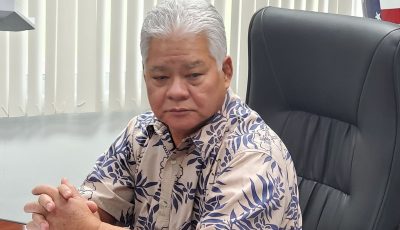Increases could imperil businesses
Businesses on Saipan are bracing themselves for a series of increases that will effectively transform the Commonwealth’s business climate from one with a low overhead to one with a high-cost environment.
For one, the filing fee for CW-1 form I -129 of the U.S. Citizenship and Immigration Services will increase from $325 per head to $460 per head, which will take effect on Dec. 23 later this year. That is an increase of $135 per foreign worker that a business will petition.
There’s also the strong possibility of a minimum wage hike, which will bump the minimum wage to the federal level of $7.25 an hour. Local politicians have made this a campaign promise in the run-up to the Nov. 8 elections and Gov. Ralph DLG. Torres has said he will sign this bill as soon as it reaches his desk.
Chow Time owner Anna Liza Guancia feels uneasy about the twin whammies affecting local businesses. Guancia said local businesses could not keep up with the rate the government is pushing for.
“The regular two choice meals plus a cup of rice at Chow Time costs customers $5. Everything is getting more expensive, from meat to vegetables, and now the minimum wage and the added USCIS renewal fee for CW-1 workers,” said Guancia.
Guancia shared that she hires seven minimum wage workers. The seven workers work 80 hours per payday, collectively costing $3,660 per month at $6.55 per hour. The USCIS CW renewal hike and the additional $150 for each non-immigrant worker employed in CNMI businesses annually costs $4,270 for seven CW-1 workers at Chow Time.
Without letting go of anyone, Guancia would be paying $43,920 ($3,660 paid 12 times) plus the $4,270 to renew her workers annually, amounting to $48,190, which is already a challenge in itself for the small business.
If the $7.25 minimum wage hike were approved, Guancia would be paying a little less than $53,000 annually.
Right now, Guancia worries about food costing without losing customers.
“How are we going to price everything without substantial losses? If we raise our prices, then our customers would also take a hit and ultimately we could lose the business,” she said.
Guancia did think of lessening the servings so as to cut costs as much as possible without having to raise the prices.
“There are customers that are complaining. They just don’t understand. So now I fear for the sustainability of the business,” she said.
Guancia also worries about her ability to renew her workers’ CW status.
“If all my contract workers get sent home because of the CW cap, I will be forced to get residents to replace them. What else could I do? Salary-wise, residents are more demanding,” said Guancia.
Guancia shares that the financial situation of the business has had a psychological toll on her.
“I get depressed, especially when payday comes. Whatever profit I get goes to buying the next day’s ingredients, which is continually increasing in price. Rent is also increasing due to everything getting more expensive.”
Guancia fears Chow Time might lose their regulars if prices continue to climb because the point of the establishment was to provide affordable yet delicious food, which is proving to be a challenge given all the increases in fees.
Hotels feel it too
Hotel Association of Northern Mariana Islands chair and Mariana Resort & Spa general manager Gloria Cavanagh said that Mariana Resort has been able to steer clear of CW problems—for the first half of 2017 at least.
“Right now, we were able to get full operational staffing through the end of this calendar year. It is not until the middle to end of the 2017 first quarter that we run into trouble,” she said.
For HANMI, it is a totally different story.
“We have hotels that are facing high percentages (up to 90 percent) of staffing in the F&B department that will be affected. How are we going to tackle this problem? Please tell me because we are at a loss. The hotel members of HANMI employ less than 1,000 CW-1 employees, and yet because of new investments, especially for construction workers, we face a labor issue that is impossible. We have to send home essential staffing to continue the operations of our only economy, tourism,” said Cavanagh.
The increase of USCIS’ CW renewal fee is at least a bit acceptable, but Cavanagh still wishes for it to be geared toward training residents rather than it being used as additional funding.
“I believe that by making the filing fees higher, this will hopefully force businesses to utilize alternative visas, such as H visas that were considered too high. However, again, I had wished that the increase were just on the educational fees that come back to the CNMI to help train our people,” said Cavanagh.
Cavanagh brought up an interesting point, suggesting that visas be offered depending on profession.
“One major point, however, regarding utilization of other visa avenues, we must enforce using visa categories that specifically cover a job category. If this was forced from the beginning, we would not be in the crisis we are in now,” said Cavanagh.



























